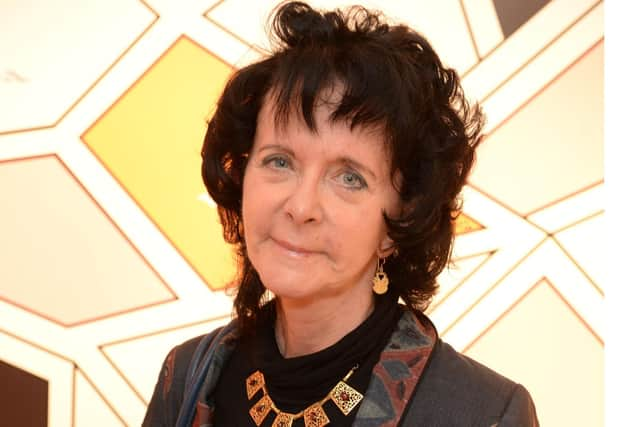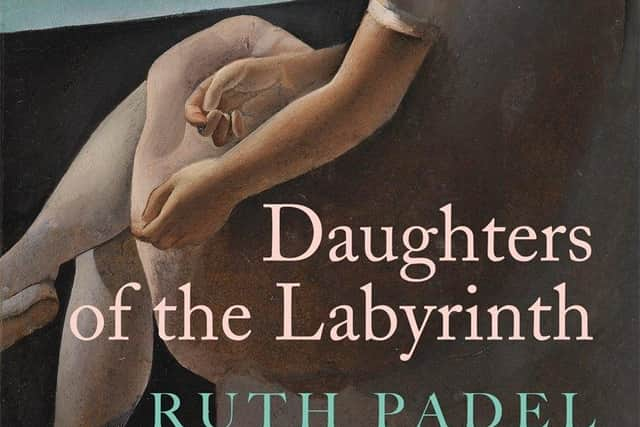Book review: Daughters of the Labyrinth, by Ruth Padel


The first section of this often entrancing novel is entitled “The World Can Fall To Pieces Any Moment.” Perhaps this should, more impressively, have been the first sentence of the narrative. It is after all one of the two themes of the novel, the other being the attempt, by delving in the past, uncovering its secrets,to make, in the manner of archaeologists, a new understanding possible.
The novel is set mostly in Crete where the terrible Minotaur lurked in the labyrinth of Knossos, the palace itself uncovered by archaeologists, and it is itself a story of excavation. It is however a more recent past – what happened in Crete in the years of the Nazi Occupation and the consequences of these events – that will be explored. The digging is into minds and memories, not the earth.
Advertisement
Hide AdThe novel begins however in London where Ri, a successful painter, herself a Cretan, has lived most of her adult life. Now, some time after the death of her English-Jewish husband David, her work is taking a new direction. Her oldest friend from student days, an Indian painter, taken to a preview of her new exhibition, tempers her admiring approval – “marvellous, beautiful, vivid and subtle,very powerful” but “there’s something missing… Disruption… the darker edge… I don’t think Crete’s done with you..” This is very good. This “darker edge” will, one senses, be revealed.


Then on the evening of the private view, Ri gets a message. Sophia, her aged mother, has had a heart attack and is in intensive care. Ri flies at once to Crete. Sitting by her mother’s bedside, willing her to live, she is startled and puzzled to hear her ask “will you say ‘kaddish’ for me?” What on earth can she mean? Kaddish – the Jewish prayer for the dead. She doesn’t understand . She was brought up in Crete and there are no Jews in Crete.
This is the take-off point for the novel which now alternates with skilful smoothness between now and then. “Now” is the prosperous and loving family, the adored Papa (Andonis) with his ever-present worry-beads and cigarette, her brothers and their families, the B&B her parents have run for years. It’s also her living memory of the family’s benefactor, an English archaeologist they knew as Mr Michael, who had fought with Papa (then a boy in his teens) in the Cretan Resistance, had paid for Ri to go art college in London, found Papa work as a pot-mender in the museum, set up her brothers in business, all for a reason we will later discover.
So the novel is a quest, excavation of the past, of wartime Crete, all set off by Sophia’s strange and disturbing request. Who was she before she was Sophia? How hard can Ri fairly press the old woman? How hard can she press her father to tell her what has so long been hidden from the family?
Some chapters are reconstructions of the war years, assembled now by Ri in the way that archaeologists assemble a portrait of a lost and buried world from the fragments they unearth. Others tell of how Ri and the family respond to their changed understanding of their parents’ life and to what they now learn about the fate of Crete’s Jews and the way in which some shamefully benefitted from this.
It’s a wonderfully rich and absorbing novel. As is usually the case with the best fiction it tells a compelling story while at the same time deepening our understanding of the complexity of our nature and enlarging our understanding.
Advertisement
Hide AdIt is also delightful in its evocation of Crete and its many-layered history. If at times some of the descriptions are a trifle on the lush side, this is a venial fault, and indeed many readers will find no fault in it at all, rather revelling in the fine writing.
The novel ends with a fashionable awareness of coronavirus and perhaps this is a mistake. If the novel had been set in, say, 2010, Papa and Sophia would have been in their eighties. As it is, it seems harsh of Ri to have required her parents, well on in their nineties, to have told her what they have so long (and for what seemed good reasons) kept hidden. But this reflection scarcely diminishes the deep pleasure this novel offers.
Advertisement
Hide AdDaughters of the Labyrinth by Ruth Padel Corsair, 319pp, £18.99
A message from the Editor
Thank you for reading this article. We're more reliant on your support than ever as the shift in consumer habits brought about by coronavirus impacts our advertisers.
If you haven't already, please consider supporting our trusted, fact-checked journalism by taking out a digital subscription at https://www.scotsman.com/subscriptions